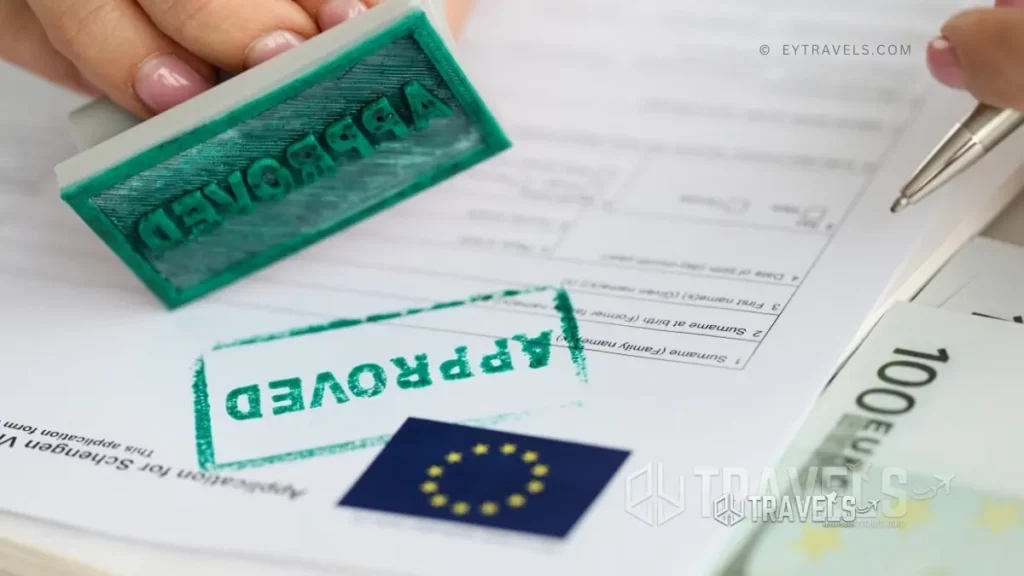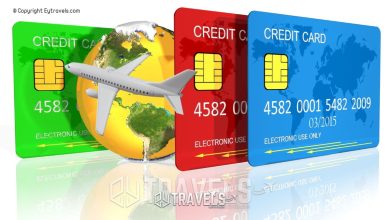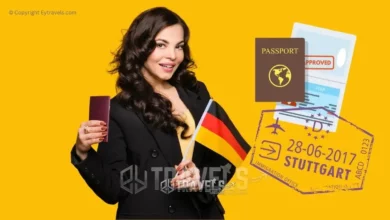Get Your Blue Card for the European Union: Work and Residence Permit
The E.U Blue Card Explained
Ready to embark on a journey of global career opportunities and cultural exploration? The Blue Card for the European Union offers a pivotal key to unlock both, beckoning international workers and expats with an enticing promise of work and residence in the heart of Europe. In this article, we unravel the nuances of the EU Blue Card – your gateway to a vibrant professional life and a chance to immerse yourself in the rich tapestry of European communities.
Imagine pursuing your career ambitions amidst the enchanting landscapes of Europe, all while fostering cross-cultural connections that enrich your personal growth. The Blue Card isn't just a permit; it's a beacon guiding you towards new beginnings and rewarding experiences. As we delve into its intricacies, let's equip you with knowledge and tools to navigate through the process seamlessly, empowering you to seize international opportunities with confidence. Join us as we demystify the pathway to acquiring your Blue Card – because every step taken brings you closer to realizing your dreams on foreign shores.
Table Of Contents
- Understanding the Blue Card for the European Union
- Eligibility Criteria for the Residence Card
- The EU Blue Card Application Process
- Benefits of Holding A EU Blue Card
- Maintaining Your Blue Card Status
- Live and Work in the European Union
- Wrapping Up
- Final Tips
- Embrace New Horizons with Your EU Blue Card
- FAQs:
Understanding the Blue Card for the European Union
The European Blue Card is a permit that allows highly skilled non-EU citizens to live and work in the European Union, designed to attract professionals with specialized skills to contribute to the EU economy. It provides a pathway for individuals seeking employment in member states by offering them legal residency rights. The significance of the Blue Card lies in its facilitation of both professional aspirations and cultural exchange, fostering diversity within the European workforce.

Those eligible for the Blue Card typically fall into categories such as IT specialists, engineers, doctors, and researchers who meet specific criteria set forth by individual EU countries. Unlike other permits, the Blue Card streamlines processes for talented workers, offering benefits such as easier family reunification options and potential paths to permanent residency status after a designated period of working within the EU. This distinguished status sets it apart from traditional work permits or visas for non-EU nationals.
The primary purpose behind introducing the Blue Card was to address skill shortages in certain sectors across EU nations while simultaneously providing opportunities for international workers looking to further their careers on a global scale. By attracting top talent from around the world with incentives like shortened approval times and reduced bureaucratic hurdles compared to standard work permits, the EU aims to remain competitive and innovative on a global stage while enhancing cultural exchanges among diverse communities. As an example, Germany actively promotes the Blue Card as a means to bolster its workforce in technology-driven fields and healthcare industries by attracting top-tier professionals worldwide.
Eligibility Criteria for the Residence Card
To be eligible for the European Union's Blue Card, individuals must meet specific criteria designed to attract highly skilled workers to the region. One of the primary requirements is having a job offer or an employment contract from a company based in an EU country that corresponds to your qualifications. This means that your skills should align with the needs of the labor market in the European Union.
For example, imagine an IT professional with expertise in cybersecurity receiving a job offer from a technology company in Germany seeking specialists in this field; this could greatly increase their chances of qualifying for a Blue Card.
Moreover, educational qualifications play a crucial role in determining eligibility for the Blue Card. Applicants generally need to have completed higher education equivalent to at least three years of study or possess relevant work experience if formal education is not available. Consider a scenario where a marketing manager with a Master's degree and several years of industry experience applies for a position in France that matches their profile—a strong academic background combined with practical knowledge could strengthen their application for it.
The Blue Card is a valuable opportunity for highly skilled non-EU/EEA nationals to work and live in the European Union, and it can be a stepping stone to permanent residence and EU citizenship.
Minimum salary thresholds vary across EU countries and are often adjusted annually. As of 2021, to qualify for the Blue Card, applicants typically need to earn a salary higher than the average national income of the respective country. For instance, someone offered a position as an engineer in Sweden must ensure that their salary meets or exceeds Sweden's average income level.
Specialized skills and professions in high demand may have different salary benchmarks set by individual EU states to ensure competitiveness and workforce quality. Therefore, demonstrating exceptional expertise in sought-after fields can make meeting these financial requirements feasible while enhancing your chances of securing approval for the EU Blue Card.
The EU Blue Card Application Process
Once you've confirmed your eligibility for the Blue Card, the next step is navigating the application process efficiently. Begin by gathering essential documents such as proof of academic qualifications, a valid job offer or employment contract, and evidence of meeting the minimum salary threshold in the country where you will be working. Pay attention to specific requirements based on your host country's regulations to ensure a smooth application process.
When completing forms for the EU Blue Card application, take your time to provide accurate and detailed information. Attention to detail is crucial in avoiding unnecessary delays or rejections. Double-check all documentation before submission to minimize errors that could prolong the processing time. Additionally, seek guidance from relevant immigration authorities or legal professionals if you encounter any complexities during the application process.
Processing times for Blue Card applications may vary depending on the country and current workload of immigration offices. While some applicants receive their Blue Cards promptly, others might experience delays due to background checks or additional verifications. It's essential to remain patient throughout this period and stay proactive by following up with authorities if there are prolonged delays. Keeping communication lines open can help expedite the process and provide clarity on any outstanding issues.
For example, Sarah, an IT professional from India, diligently prepared her documents and submitted her Blue Card application in Germany. By staying organized and responsive to requests from authorities, she received her Blue Card within three months of applying. Sarah's proactive approach not only streamlined her application but also allowed her to commence work smoothly in Europe without unnecessary delays or complications.
By strategically approaching each stage of the application process with thorough preparation and attention to detail, applicants can enhance their chances of securing a Blue Card efficiently and embarking on their European career journey seamlessly.
Benefits of Holding A EU Blue Card
The advantages of holding a Blue Card extend far beyond just enabling you to work and reside in the European Union. One key perk is the ability to enjoy visa-free travel within the Schengen countries, allowing for seamless exploration and cultural enrichment across borders. Imagine weekends spent in Paris, evenings in Vienna, or summer getaways to the beaches of Spain with minimal bureaucratic hassles – all made possible by your Blue Card status.
Family reunification opportunities are another significant benefit that can truly enrich your experience as an expatriate. The Blue Card makes it easier for your loved ones to join you in your new European home, fostering stronger bonds and creating lasting memories together. Whether it's celebrating milestones, sharing everyday moments, or simply having a support system nearby, being able to unite with family members adds invaluable depth to your journey abroad.
Additionally, holding a Blue Card provides access to essential social security rights, ensuring that you and your dependents are covered in various aspects such as healthcare, pensions, unemployment benefits, and more. This safety net offers peace of mind and stability as you navigate life in a new country. Real-life stories abound with individuals who have benefitted immensely from the security and opportunities that come hand-in-hand with possessing a Blue Card – from pursuing thriving careers to establishing fulfilling personal lives in Europe.
One remarkable example is Sarah, an IT professional from Canada who secured a job opportunity in Germany through her Blue Card. Not only did this open doors for career growth with leading tech firms but also paved the way for her family to join her seamlessly under family reunification provisions. Sarah reflects on how the convenience of visa-free travel allowed her to explore diverse cultures during weekends and holidays.
Besides, with access to robust social security systems provided by her Blue Card status, she feels assured knowing she has comprehensive coverage for any unforeseen circumstances. The positive impact of obtaining a Blue Card can truly transform lives and create opportunities for holistic growth and fulfillment in the dynamic landscape of Europe's work environment.
Cultural Integration & Community Support
Moving to a new country for work with a Blue Card opens the doors to exciting cultural experiences and opportunities for personal growth. To effectively integrate into European cultures, expats can start by enrolling in language courses tailored to the local tongue.
Mastering the language
Mastering the language not only facilitates day-to-day interactions but also demonstrates respect for the local culture, helping forge deeper connections with colleagues and neighbors. For instance, imagine an expat working in Germany who decides to join a German language conversation group outside of work hours; this simple step can lead to profound cultural insights and lasting friendships.
Networking Events
Networking events play a vital role in establishing both personal and professional relationships within the community. Attending industry gatherings or social meetups not only expands one's circle but also exposes individuals to diverse perspectives and potential career opportunities. Consider an expat relocating to France who engages in networking events specific to their field—this proactive approach could lead to mentorship opportunities or collaborations that enrich their professional journey.
Furthermore, participation in community organizations dedicated to supporting expats from similar backgrounds fosters a sense of belonging and provides a platform for shared experiences.
Building Relationships
Building relationships beyond work environments is crucial for holistic integration and personal development when living abroad with a Blue Card. Expats are encouraged to embrace local traditions, cuisines, and customs by engaging with community activities or attending cultural festivals.
Imagine an expat residing in Spain who immerses themselves in flamenco dancing classes or joins a local cooking club; these immersive experiences not only foster cross-cultural understanding but also enhance overall well-being through active engagement within the new environment. By actively participating in communal activities, expats can strengthen their support networks, navigate challenges more effectively, and truly make the most of their international experience with a Blue Card.
Maintaining Your Blue Card Status
After successfully obtaining your EU Blue Card for the European Union work and residence permit, it's essential to understand what it takes to maintain this coveted status. One key responsibility involves ensuring timely renewals, as the Blue Card is typically valid for one to four years and must be extended before its expiration. Failure to renew on time could lead to legal complications and even potential expulsion from the country.
Moreover, any changes in employment status or personal details should promptly be reported to the relevant authorities to avoid compliance issues. Continuous residence is a crucial requirement for Blue Card holders. It's important to stay informed about the minimum residency period specified by the EU Member State where you're residing, as prolonged absences from the country can jeopardize your eligibility to hold the Blue Card. For instance, if you plan an extended trip outside the EU for personal reasons, ensure that you comply with regulations regarding permissible durations of absence without impacting your residential status.
To provide insights into common pitfalls or mistakes that might put your Blue Card status at risk, consider the following scenario: Emma secured a high-paying job in Germany and obtained her Blue Card. However, she neglected to update her address when she moved within the country after changing apartments.
This oversight led to delays in receiving important communication related to her permit renewal, resulting in temporary uncertainty about her legal standing. Emma learned from this experience and realized the importance of proactively managing all administrative aspects tied to maintaining her Blue Card status for a smooth immigration journey in Europe.
Live and Work in the European Union
Through your Blue Card status, whether in bustling cities like Berlin or cozy towns in Denmark, you have the chance to immerse yourself in diverse cultures, flavors, and perspectives. Imagine strolling through cobblestone streets after work in Amsterdam, attending local festivals in Barcelona on weekends, or simply savoring croissants fresh from a Parisian boulangerie – these experiences await those who embrace the opportunities that come with international mobility.

Seize every moment to learn a new language, try unfamiliar cuisines, make friends from around the globe – your Blue Card is your gateway to a life enriched by both professional success and personal fulfillment.
Remember that beyond paperwork lies a world of support systems eager to help you settle into your new home away from home. From language courses tailored to expats' needs to social events designed for networking across borders, there are resources aplenty to aid your cultural integration journey. Take advantage of these offerings not just for compliance but for genuine connection and growth.
Embrace this chapter of your life with an open heart and an eagerness to contribute positively both at work and within your newfound community. Your Blue Card isn't just a permit; it's an invitation to weave yourself into Europe's vibrant tapestry of talents and traditions.
Wrapping Up
As you embark on the journey of obtaining and holding a Blue Card for your European Union work and residence permit, remember that this is more than just a legal document – it's a key to unlocking a world of possibilities.
By meeting the eligibility criteria and successfully navigating the application process, you are laying the foundation for a future filled with professional growth, cultural enrichment, and personal development. The Blue Card isn’t just about where you can work; it’s about the new horizons you can explore and the connections you can foster.
Final Tips
After familiarizing yourself with the ins and outs of the Blue Card for the European Union work and residence permit, here are three essential tips to enhance your journey towards obtaining and maintaining this valuable document:
1. Research Thoroughly Before Applying:
Before taking the leap into applying for a EU Blue Card, invest time in researching job markets within EU countries that align with your skills and qualifications. Understanding which countries have higher demand for your expertise can increase your chances of securing employment offers meeting Blue Card criteria. Consider reaching out to professional networks or online forums where expats share their experiences to gain insights on potential opportunities.
2. Build a Strong Support System:
Relocating to a new country can be both exciting and challenging. To make the transition smoother, focus on building a support system that includes fellow expats, locals, or community organizations and clubs catering to international residents. Engaging in local activities or language exchange programs not only aids in cultural integration but also provides a sense of belonging that is crucial for personal well-being during your stay in Europe.
3. Stay Informed and Updated:
The landscape of immigration policies can evolve quickly, impacting EU Blue Card regulations and requirements. It’s vital to stay informed about any changes introduced by EU member states regarding work permits, residency rules, or other relevant matters affecting expatriates. Regularly check official government websites or consult with immigration experts to ensure you are up-to-date with any modifications that may impact your Blue Card status.
By heeding these tips, you can navigate the process of obtaining and holding a Blue Card more effectively, setting yourself up for success as you embark on your professional journey in Europe while enjoying the rich cultural tapestry the continent has to offer!
Embrace New Horizons with Your EU Blue Card
Through this guide, you've uncovered the keys to unlocking new opportunities in Europe with the Blue Card. By understanding the eligibility criteria, navigating the application process efficiently, and recognizing the benefits that come with it, you are well on your way to a successful journey of work and residence in the European Union. The path may seem daunting at times, but remember that each step brings you closer to a world of possibilities waiting to be explored.
As an expat or international worker seeking to make your mark in Europe, holding a Blue Card can be a turning point in your career and personal growth. Beyond legalities and paperwork lies a realm of cultural integration, community support, and enriching experiences that await you as you embrace this new chapter. By maintaining your Blue Card status diligently and immersing yourself in diverse cultures, you not only elevate your professional profile but also expand your horizons in ways you never imagined.
FAQs:
Q. Can I apply for a Blue Card if I am self-employed?
A: No, the Blue Card is specifically designed for those who have an employment contract or binding job offer from an employer based in an EU country.
Q. Is there an age limit to apply for a Blue Card?
A: There is no specific age limit set for applying for a Blue Card; however, meeting the education and salary requirements is crucial regardless of age.
Q. Can family members accompany me if I hold a Blue Card?
A: Yes, family reunification opportunities are available for Blue Card holders, allowing their spouses and dependent children to join them in Europe.
Q. What happens if I lose my job while holding a Blue Card?
A: If you lose your job while holding a Blue Card, you have up to three months to find new employment that meets the criteria or risk losing your permit.
Q. Can I travel outside the EU countries with my Blue Card?
A: With a valid Blue Card, you can enjoy visa-free travel within the Schengen Zone for short stays (up to 90 days within a 180-day period) without needing an additional visa.







🧭✈️🌎Discover More, Like Never Before …
😍✔Join Thousands of Subscribers
😌 Just Let Go … ✈️
hashtag#eytravels hashtag#travel hashtag#trip hashtag#aroundtheworld hashtag#discover hashtag#explore hashtag#vlog
https://lnkd.in/dDqBypqp